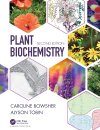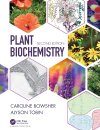By: Caroline Bowsher(Author), Alyson Tobin(Author)
490 pages, 283 colour illustrations
![Plant Biochemistry Plant Biochemistry]()
Click to have a closer look
About this book
Contents
Customer reviews
Biography
Related titles
About this book
Plant Biochemistry focuses on the molecular and cellular aspects of each major metabolic pathway and sets these within the context of the whole plant. Using examples from biomedical, environmental, industrial and agricultural applications, it shows how a fundamental understanding of plant biochemistry can be used to address real-world issues. It illustrates how plants impact human activity and success, in terms of their importance as a food supply and as raw materials for industrial and pharmaceutical products, and considers how humans can benefit from exploiting plant biochemical pathways.
All chapters in this second edition have been substantially revised to incorporate the latest research developments, and case studies include updates on progress in developing novel plants and plant products. The artwork, now in full colour, superbly illustrates the key concepts and mechanisms presented throughout.
Key features:
- Presents each topic from the cellular level to the ecological and environmental levels, placing it in the context of the whole plant.
- Biochemical pathways are represented as route maps, showing how one reaction interacts with another both within and across pathways.
- Includes comprehensive reading lists with descriptive notes to enable students to conduct their own research into topics they wish to explore further
- The wide-ranging approach of this book emphasizes the importance of teaching and learning plant biochemical pathways within the framework of what the pathway does and why it is needed.
- Illustrates the fundamental significance of plants, in terms of their importance as a food supply, as raw materials and as sources of novel products.
Plant Biochemistry is invaluable to undergraduate students who wish to gain insight into the relevance of plant metabolism in relation to current research questions and world challenges. It should also prove to be a suitable reference text for graduates and researchers who are new to the topic or who wish to broaden their understanding of the range of biochemical pathways in plants.
Contents
1. Introduction
2. Approaches to Understanding Metabolic Pathways
3. Plant Cell Structure
4. Light Reactions of Photosynthesis
5. Photosynthetic Carbon Assimilation
6. Respiration
7. Synthesis and Mobilization of Storage and Structural Carbohydrates
8. Nitrogen and Sulfur Metabolism
9. Lipid Biosynthesis
10. Alkaloids
11. Phenolics
12. Terpenoids
Customer Reviews
Biography
Caroline Bowsher is an Associate Dean for Teaching, Learning and Student Experience in the Faculty of Biology, Medicine and Health at The University of Manchester. She is a Professor of Biology and a National Teaching Fellow. Her research interests are plastid metabolism and the interrelationships between carbohydrate and nitrogen metabolism.
Alyson Tobin is the Vice Principal for Learning and Teaching at Edinburgh Napier University. She is a Professor of Biology, a Fellow of The Royal Society of Biology, a Director of the James Hutton Institute and holds an honorary chair at the University of St Andrews. Her research areas are ammonium assimilation, and chloroplast and mitochondrial development in plants.
By: Caroline Bowsher(Author), Alyson Tobin(Author)
490 pages, 283 colour illustrations
The book is well arranged and printed. Many illustrations and blue boxes highlighting an area that merits a particular attention make sophisticated text readable. This very useful textbook certainly find place on the shelves of many students as well as their teachers. Biologia Plantarum "! I very much appreciated this text book because it presents an updated source of basic knowledge on plant biochemistry, taking benefit from the recent advances in "omics"! This is clearly a textbook to recommend to students and their teachers." Plant Science "These authors have provided a useful reference text for students and researchers." Biologist


































